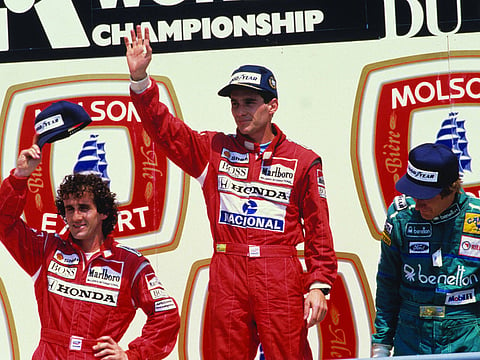You only sing when you're winning
Suggestions that Formula 1 is boring are ill-founded and wrong

For reasons I won’t bore you with, I didn’t watch the Brazilian Grand Prix this weekend. I didn’t really need to either, as the crucible of wisdom and reason that is my personal Facebook newsfeed was awash with comments of boredom and Mercedes domination and “it wasn’t like this in my day, I tells ya!”
One digital acquaintance commented that he hoped the two Mercedes would crash into each other and that his beloved Ferraris would win, 1-2, before going on to dominate 2016. He is bored of Formula 1; he believes that the rivalry between Lewis Hamilton and Nico Rosberg is the most boring in F1 history.
Then another person who I haven’t seen for over eight years piped up saying that he was bored with F1 too, and that all the races are dull, and he wants the engines changed, and that he much preferred watching Grands Prix when Red Bull dominated.
This pattern is commonplace in my digital world – watch race, slate race, watch next race, repeat.
It seems that people are bored with Mercedes winning everything. Not because it’s a team winning, but because it’s not their favourite team winning.
Sport being billed as “boring” differs from person to person. Some describe F1 as “boring” if 20 cars race around in a procession for 60 laps. Some believe that F1 is boring if the same team wins everything for a couple of seasons. And some people think F1 is boring full-stop.
Weirdly, these people are still “fans” and their opinions matter – even the ones that don’t want to watch the sport. According to most stakeholders – FOM, the FIA, the teams, the fans, the myriad working groups, polar bears – Formula 1 is never allowed to be “boring”. It must be entertaining all the time, at all costs.
Of course, this idea is bonkers. A sure-fire, guaranteed way to fail is to try and please everyone.
The modern infatuation with bright, shiny entertainment, bang, boom, kazaam, is daft. The idea that every race and every season must be flat-out exciting is unrealistic and unachievable. I’ve touched on this before, which you can read here.
Try this for a sketchy analogy: every weekend in England alone there are 46 football matches played in the top four professional leagues. Over the course of a full league season that totals to 4,072 games. How many of those 90-minute games will be exciting? How many will be anonymous 0-0 draws, and how many will be a “great performance from the lads” for one team and “Leeds sack eleventy-twelfth manager this season” for the other?
It’s true; sport isn’t much fun when you’re losing.
Any real fan will watch a Grand Prix regardless of how “boring” it is. I remember those long, dreary Sunday afternoons in the early 2000s when F1 was nothing more than a Michael Schumacher and Ferrari benefit race. Ferrari and Schumi fans loved it – to them it was the highlight in F1’s history, a modern day “Golden Era”. To the rest of us though, it wasn’t much fun. So much so, that the rulebook was re-written to knock Ferrari off the top.
Yet still, hypocrisy aside, I tuned into every race and watched regardless, in the hope that someone, anyone, would topple Schumacher. It took five years, but we got there in the end.
Schumacher's and Ferrari’s reign was always going to come to and end, just like Sebastian Vettel's and Red Bull’s reign ended at the end of 2013. They always do.
Like Ferrari, Red Bull, Williams, and McLaren before them, Mercedes is enjoying a period of domination. Don’t complain because that is the sport. Don’t whine because it’s not your favourite team, don’t moan because you think the fascinating battle between Hamilton and Rosberg is dull, and don’t say that “F1 is boring these days”. It has always been, and will always be this way. How you perceive it will differ, but if it truly was “boring” then you wouldn’t be watching, would you?
Who won in Brazil, by the way?



